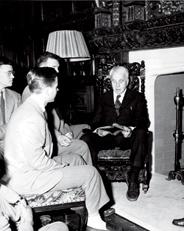By Emily Gold Boutilier
 An NBC television crew came to campus in 1950 to film Frost as he read his poems to students.
|
Excluding the perennial contributors to the class notes, no one has appeared in Amherst magazine more often than Robert Frost, who taught poetry at Amherst on and off from 1916 to 1963.
In 1923, for example, the magazine reported that Frost would teach two courses—one in English, “covering a wide field somewhat off the usual line of standard classics,” the other in philosophy, about “the verdicts, judgments, and evaluations arrived at in history, religion, and the arts.”
An NBC television crew came to campus in 1950 to film Frost as he read his poems to students. From the magazine report: “Later, when it was known when the readings would be telecast, Mr. Frost was advised that television sets in Amherst were rare since reception is extremely poor. It was suggested that he just look for a house supporting an antenna and make himself at home. ‘But you really can’t tell,’ he replied. ‘They tell me you can buy one of those masts to stick on the top of your house for $3.00—just so everyone will think you’re one of the people.’”
A 1953 magazine article sheds light on Frost’s use of metaphor. “He said that in his own poems he had avoided using symbolic or specialized metaphors which had particular meanings in specific situations but spoke in broad metaphors intelligible to all who might make the effort to understand them. ‘If I wanted you to know what I meant,’ he said, ‘I’d have told you.’”
Frost, who played football in high school, spoke to the Amherst team in 1960. His quotes are gems: “Some people say it doesn’t matter whether you win. You know, they were saying ‘as long as man gets to the moon we don’t care who it is.’ But I care; I want us to get there first.” The poet continued: “I call those people liberals. They always feel sorry when they beat somebody. They always want to apologize for winning.” According to the magazine, Frost “told of his attendance at a meeting where the discussion turned on ‘getting rid of stadia … [T]hose people don’t say stadiums, they say stadia. I don’t know how I got invited.’”
Fast forward to 2006, when the magazine interviewed John Lancaster, retired curator of special collections, about his recent discovery of two never-published Frost poems. One, “The Inscription in the Desert,” had been inscribed in a book to Dwight Whitney Morrow Jr. ’33 in 1930.
The magazine’s most recent Frost mention was in 2007, when workers installed a granite sculpture of the poet, commissioned by the Class of 1957, near the War Memorial.